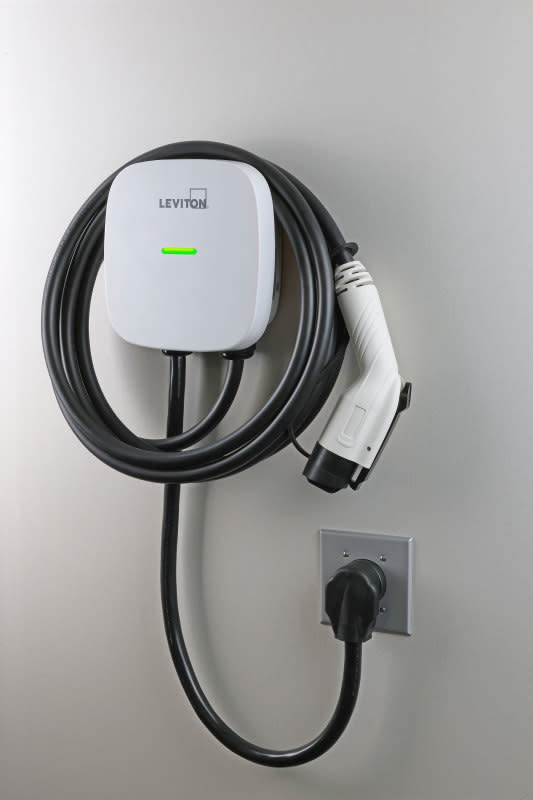Leviton’s Newest EV Series Smart Home Chargers Offer Added Convenience
Are you grappling with the idea of getting your EV charger hardwired? A leader in smart home solutions and EV equipment, Leviton, just upgraded its EV Series Smart Home charging stations to be plug-in compatible. The new plug-in model features a NEMA 14-50 plug, so it'll work if you have a NEMA 14-50 receptacle, such as the brand's new 50 Amp Heavy Duty EV Charging Receptacle. Plug-in functionality is quickly becoming the industry standard and common type sought by many new EV owners. Leviton's product provides consumers with the all of the same benefits of their previously hardwired model, plus the added benefit of portability and flexibility, should you need to relocate your charging station.
“As the EV charging industry continues to grow and expand into new areas, so does Leviton,” said Andrew Taddoni, director of EVSE business development and product management, Leviton commercial & industrial. “The new plug-in charger is just the latest expansion of our portfolio, providing EV owners with the same benefits of our hardwired charging stations, plus the added benefit of portability and flexibility.”
Leviton's EV Series Smart Home chargers enable drivers to:
Schedule charging stations in advance (ideal if you plan to charge during off-peak utility hours)
View the charging status of their vehicle
Remotely start or stop charging from anywhere if the electric vehicle is plugged in
Receive fault notifications in the event of an electrical issue
Make the most app-enablement for convenience
Related: How to Protect Your Home Against Fires Caused By EV Lithium-ion Batteries
Product Features
EV Series Smart Home Level 2 Electric Vehicle Charging Station
40A
9.6kW Output
Water-resistant enclosure rated NEMA Type 3R (can be installed indoors and out)
25' cord designed to prevent freezing and cracking in extreme weather
Includes Mounting Bracket and Pre-attached 3ft long input cable with NEMA 14-50P Plug
Optional RFID Control
Wi-Fi Compatible
Remote enablement via My Leviton App
2-year warranty

Leviton
Plug-in vs. Hardwired Chargers
The brand clearly still sells both, so what are the main benefits of each?
Plug-in chargers are easier to install. If you're in a space short-term or expect to have to relocate, you can move the charging station without major modifications to the electrical system. Or, if you don't know where to install your charging station, this'll make it easier for you to sleep at night. Some lingering deterrents believe that plug-in models place more wear and tear on the plug due to the cable design... which flat-out makes no sense. Once the unit is plugged in, it remains plugged in. It's not a toaster.
There are still plenty of reasons you may opt for hardwiring, but as technology advances, we see the rational weakening. Hardwired chargers are permanently installed into the electrical system, which could and should improve reliability and safety, and reduce the likelihood of minor faults if properly integrated. They're more weather resistant, especially for outdoor use in extreme climates. Hardwired chargers are ideal if you need a long-term EV charging station, but the main downside is that they require professional setup (which is sometimes expensive). Plus, when you need to sell your home or move, you'll have to leave the product or hire an electrician to uninstall it for you.
Related: Does Homeowners Insurance Protect Against Damage Caused By Your Electric Car?
